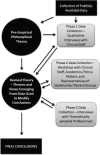Who gets the gametes? An argument for a points system for fertility patients
- PMID: 29194680
- PMCID: PMC5767753
- DOI: 10.1111/bioe.12411
Who gets the gametes? An argument for a points system for fertility patients
Abstract
This paper argues that the convention of allocating donated gametes on a 'first come, first served' basis should be replaced with an allocation system that takes into account more morally relevant criteria than waiting time. This conclusion was developed using an empirical bioethics methodology, which involved a study of the views of 18 staff members from seven U.K. fertility clinics, and 20 academics, policy-makers, representatives of patient groups, and other relevant professionals, on the allocation of donated sperm and eggs. Against these views, we consider some nuanced ways of including criteria in a points allocation system. We argue that such a system is more ethically robust than 'first come, first served', but we acknowledge that our results suggest that a points system will meet with resistance from those working in the field. We conclude that criteria such as a patient's age, potentially damaging substance use, and parental status should be used to allocate points and determine which patients receive treatment and in what order. These and other factors should be applied according to how they bear on considerations like child welfare, patient welfare, and the effectiveness of the proposed treatment.
Keywords: allocation; eggs; fertility; gametes; points; reproduction; sperm.
© 2017 The Authors. Bioethics Published by John Wiley & Sons Ltd.
Similar articles
-
Causal parenthood and the ethics of gamete donation.Bioethics. 2019 Feb;33(2):267-273. doi: 10.1111/bioe.12537. Epub 2018 Nov 27. Bioethics. 2019. PMID: 30480852
-
In vitro gametogenesis: The end of egg donation?Bioethics. 2019 Jan;33(1):60-67. doi: 10.1111/bioe.12499. Epub 2018 Aug 23. Bioethics. 2019. PMID: 30136749 Free PMC article.
-
Bioethics, children, and the environment.Bioethics. 2018 Jan;32(1):3-9. doi: 10.1111/bioe.12386. Epub 2017 Sep 5. Bioethics. 2018. PMID: 28873213 Free PMC article.
-
[What issues, changes and adaptations for French ART centers in the context of the new bioethics law?].Gynecol Obstet Fertil Senol. 2022 Dec;50(12):777-787. doi: 10.1016/j.gofs.2022.08.005. Epub 2022 Sep 9. Gynecol Obstet Fertil Senol. 2022. PMID: 36096450 Review. French.
-
Artificial Gametes and Human Reproduction in the 21st Century: An Ethical Analysis.Reprod Sci. 2024 Aug;31(8):2174-2183. doi: 10.1007/s43032-024-01558-z. Epub 2024 May 23. Reprod Sci. 2024. PMID: 38780744 Review.
Cited by
-
Stakeholders views on the ethical aspects of oocyte banking for third-party assisted reproduction: a qualitative interview study with donors, recipients and professionals.Hum Reprod. 2019 May 1;34(5):842-850. doi: 10.1093/humrep/dez032. Hum Reprod. 2019. PMID: 30927419 Free PMC article.
References
Publication types
MeSH terms
LinkOut - more resources
Full Text Sources
Other Literature Sources
Medical


